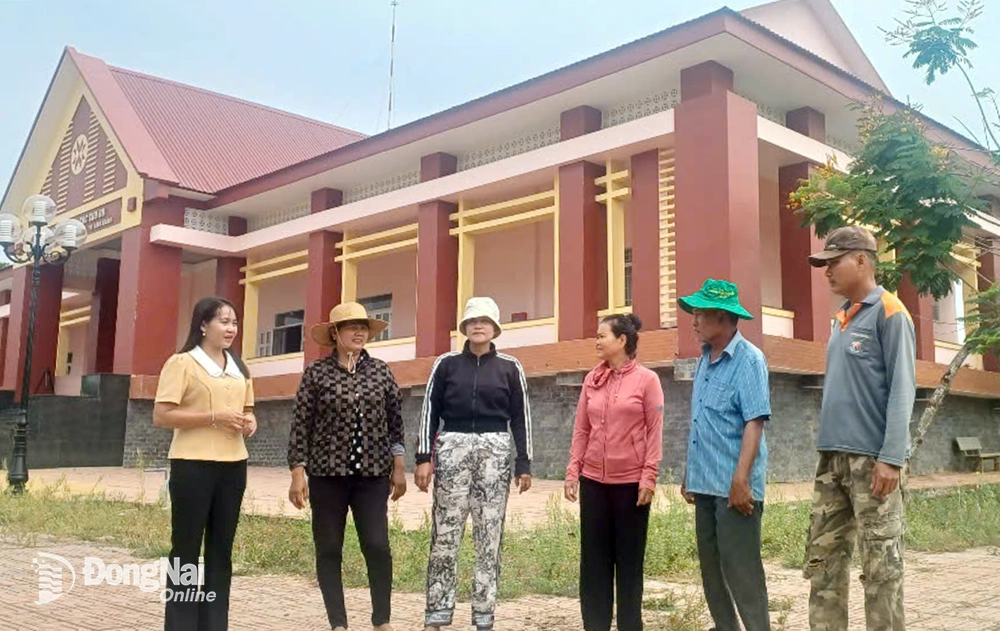 |
| Ms. Thi Thi, Vice Chairwoman of Bao Vinh Ward People's Committee (left cover), visited and encouraged the Choro ethnic people. Photo: A.Nhon |
Clear changes
One day in mid-April 2025, we followed local officials to visit the Choro Ethnic Village in Ruong Lon Quarter (Bao Vinh Ward). The nearly 2km-long road to the Choro Ethnic Village has been newly paved, spacious, and clean. Coming here, we felt the joyful and bustling atmosphere spreading to every alley as people were preparing for the 50th Anniversary of the Liberation of the South and National Reunification (April 30, 1975 - April 30, 2025). In particular, the joy doubled when people had just harvested a new rice crop with high yield.
Mr. Mai Van Luong, a prestigious person among ethnic minorities in Bao Vinh ward, excitedly shared: “Previously, the Choro ethnic people practiced agriculture in the traditional way, only growing 1-2 rice crops/year. Rice cultivation mainly relied on nature, so the yield was very low, from 2-3 quintals of rice/sao/crop. Currently, people have known how to apply advanced science and technology to agriculture and grow rice 3 crops/year, so the yield is very high, from 9 quintals to more than 1 ton of rice/sao/crop”.
When talking about the resistance land, Mr. Mai Van Luong said that he was born and raised in Bao Vinh ward (formerly Bao Vinh commune) so he has a thorough understanding of this land. Bao Vinh ward used to be the resistance base of Long Khanh City Party Committee and the war here was very fierce. However, the Choro ethnic people are still determined to stay here.
"Our people wholeheartedly followed the Party and the revolution, so during the day we went to work on the fields and at night we secretly hid rice to feed the revolutionary cadres," Mr. Luong confided.
Mr. Nguyen Minh Hoang (who directly participated in the resistance war against the American imperialists, in Ruong Lon quarter, Bao Vinh ward) said that the characteristic of Bao Vinh land before 1975 was that it was a suburb of Long Khanh provincial capital, surrounded by forests, so the landscape was still very wild. Moreover, this land was located in a strategic hamlet and about 2km from the 18th Division of the Saigon government. The revolutionary side also arranged secret guerrilla forces specializing in operating in enemy territory. Therefore, Bao Vinh land was known as the "land of fire" with many fierce battles between our army and the enemy.
“Because the war was fierce, there were very few people living in Bao Vinh at that time, mainly ethnic minorities who came to reclaim land and cultivate. But thanks to the love and mutual protection between the army and the people (the army created favorable conditions for the people to cultivate, and the people supported the army with food supplies), the revolutionary movement operated very effectively in the enemy's heartland and contributed to the liberation of Long Khanh, and then to the liberation of the South later on,” Mr. Hoang recounted.
After liberation, Bao Vinh ward was considered a "good land, birds flock" so people from all over the country came to live and work. Life was difficult at first, but people were determined to stay and find ways to rise up. Up to now, the lives of people here have improved significantly.
Mr. Mai Van Luong added that currently, the Choro ethnic minority village has over 100 households with over 400 people. In recent times, the Party and the State have regularly paid attention to and supported the ethnic minority people in many aspects such as: creating favorable conditions for them to access preferential loans to invest in developing the family economy; mobilizing them to participate in training courses to improve agricultural skills; supporting plant and animal varieties... Many people have since strived to do business and escape poverty sustainably.
“The years of poverty and hunger are gone, replaced by abundance and prosperity. Currently, many families in the Choro ethnic village have food and savings,” Mr. Luong shared.
Secretary of the Party Committee, Chairman of the People's Committee of Bao Vinh Ward TRAN VAN KIM said that when Bao Vinh Ward was recognized as a new rural commune, the average income per capita/year of the people was only over 36 million VND. By 2019, when Bao Vinh Ward was established, the average income of the people increased to 67 million VND/person and continued to increase to 120 million VND/person by the end of 2024.
Worthy of the title of Heroic Unit of the People's Armed Forces
Party Secretary and Chairman of Bao Vinh Ward People's Committee Tran Van Kim said that in recent times, the Ward People's Committee has actively implemented the system of traffic and infrastructure works. By the end of 2019, 100% of the main roads in the ward had been asphalted, 90% of the alleys had been concreted and most of the roads had electric lighting systems.
Many projects in Bao Vinh ward have been upgraded synchronously such as: building a new Choro ethnic cultural house; inaugurating the memorial stele for 36 martyrs who died in the battle of Hoang Dieu Fort in 1968; renovating the road to Choro ethnic village... Currently, the ward has all the necessary technical infrastructure to meet the living needs of the people.
In addition, the authorities and people of Bao Vinh ward have exploited the local advantages to develop agriculture, industry and services in parallel in building new rural areas. In particular, focusing on exploiting the strengths of developing rural industries, especially small-scale industry and agricultural services, contributing to shifting the rural economic structure, labor structure and creating jobs, increasing income for people. The issue that the Party and local authorities are most concerned about is increasing farmers' income by converting crops, applying science and technology, and introducing new high-yield and good-quality varieties into production.
Along with economic development, the education and health sectors have also received investment attention, such as: building new medical stations and a solid and spacious school system with 4/4 schools recognized as meeting national standards. In addition, the administrative reform work has been promoted by the Ward People's Committee, improving the efficiency and quality of the one-stop and one-stop mechanism in handling administrative procedures, improving the satisfaction level of people and businesses. Thereby, contributing to creating a healthy and rich cultural environment; spreading civilized lifestyle, improving the quality of material and spiritual life of people in the ward.
In the coming time, the Party Committee and the government of Bao Vinh ward will continue to unite and strive to fulfill the targets assigned by the superiors to be worthy of the title of Heroic Unit of the People's Armed Forces recognized by the President and authorized by the province to be awarded in 2012.
An Nhon
Source: https://baodongnai.com.vn/xa-hoi/202504/doi-thay-noi-vung-can-cu-khang-chien-xua-24312a6/


![[Photo] Chinese, Lao, and Cambodian troops participate in the parade to celebrate the 50th anniversary of the Liberation of the South and National Reunification Day](https://vphoto.vietnam.vn/thumb/1200x675/vietnam/resource/IMAGE/2025/4/30/30d2204b414549cfb5dc784544a72dee)

![[Photo] Cultural, sports and media bloc at the 50th Anniversary of Southern Liberation and National Reunification Day](https://vphoto.vietnam.vn/thumb/1200x675/vietnam/resource/IMAGE/2025/4/30/8a22f876e8d24890be2ae3d88c9b201c)
![[Photo] The parade took to the streets, walking among the arms of tens of thousands of people.](https://vphoto.vietnam.vn/thumb/1200x675/vietnam/resource/IMAGE/2025/4/30/180ec64521094c87bdb5a983ff1a30a4)





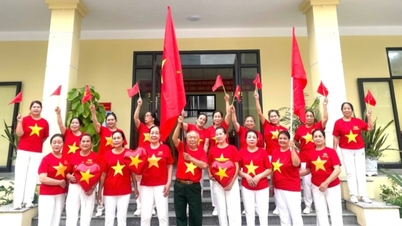
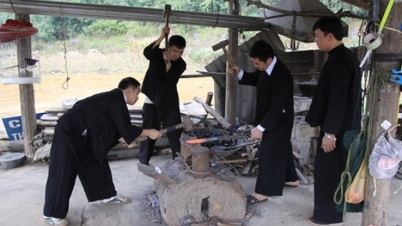





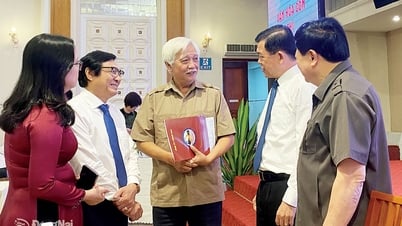
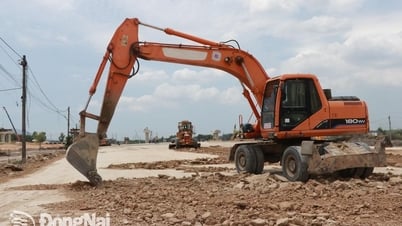


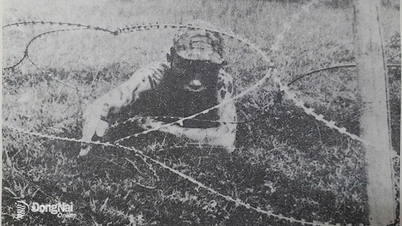

![[Photo] Performance of the Air Force Squadron at the 50th Anniversary of the Liberation of the South and National Reunification Day](https://vphoto.vietnam.vn/thumb/1200x675/vietnam/resource/IMAGE/2025/4/30/cb781ed625fc4774bb82982d31bead1e)















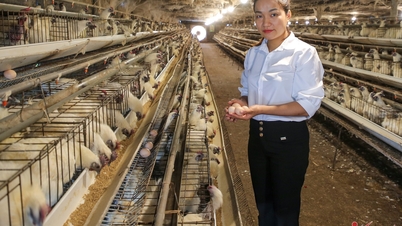


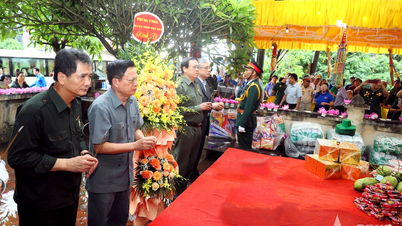
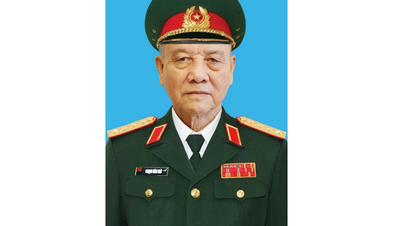























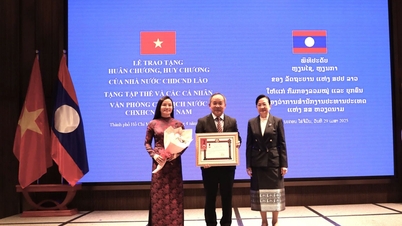

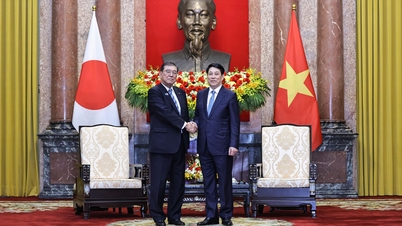

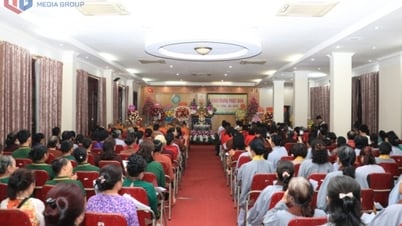






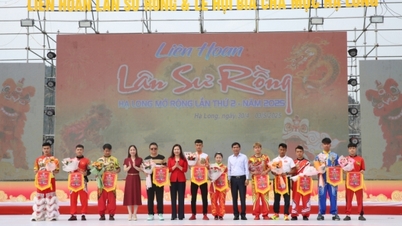











Comment (0)